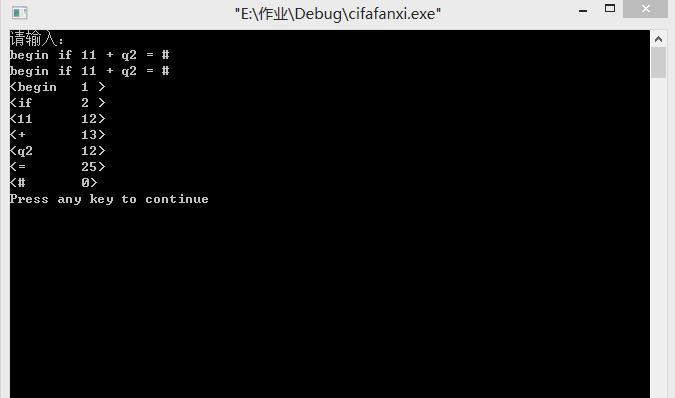#include <stdio.h>
#include <stdlib.h>
#include <string.h>
typedef struct node{
char zifuji[20];
struct node *next;
}NODE;
typedef struct stack{
char num[20];
int size;
}STACK;
void cmp(char *ch);
int shizi(char ch[]);
//字轉詞
void zizhuanci(NODE *node){
NODE *p;
p=node->next;
while(p!=NULL){
cmp(p->zifuji);
p=p->next;
}
}
//判斷詞義
void cmp(char *ch){
int key;
if(strcmp(ch,"begin")==0){
printf("<%s \t 1 >\n",ch);
}
else if(strcmp(ch,"if")==0){
printf("<%s \t 2 >\n",ch);
}
else if(strcmp(ch,"then")==0){
printf("<%s \t 3 >\n",ch);
}
else if(strcmp(ch,"while")==0){
printf("<%s \t 4 >\n",ch);
}
else if(strcmp(ch,"do")==0){
printf("<%s \t 5 >\n",ch);
}
else if(strcmp(ch,"end")==0){
printf("<%s \t 6 >\n",ch);
}
else if(strcmp(ch,"+")==0){
printf("<%s \t 13>\n",ch);
}
else if(strcmp(ch,"-")==0){
printf("<%s \t 14>\n",ch);
}
else if(strcmp(ch,"*")==0){
printf("<%s \t 15>\n",ch);
}
else if(strcmp(ch,"/")==0){
printf("<%s \t 16>\n",ch);
}
else if(strcmp(ch,":")==0){
printf("<%s \t 17>\n",ch);
}
else if(strcmp(ch,":=")==0){
printf("<%s \t 18>\n",ch);
}
else if(strcmp(ch,"<")==0){
printf("<%s \t 20>\n",ch);
}
else if(strcmp(ch,"<=")==0){
printf("<%s \t 21>\n",ch);
}
else if(strcmp(ch,"<>")==0){
printf("<%s \t 22>\n",ch);
}
else if(strcmp(ch,">")==0){
printf("<%s \t 23>\n",ch);
}
else if(strcmp(ch,">=")==0){
printf("<%s \t 24>\n",ch);
}
else if(strcmp(ch,"=")==0){
printf("<%s \t 25>\n",ch);
}
else if(strcmp(ch,";")==0){
printf("<%s \t 26>\n",ch);
}
else if(strcmp(ch,"(")==0){
printf("<%s \t 27>\n",ch);
}
else if(strcmp(ch,")")==0){
printf("<%s \t 28>\n",ch);
}
else if(strcmp(ch,"#")==0){
printf("<%s \t 0>\n",ch);
}
else{
key=shizi(ch);
if(key==1)
printf("<%s \t 12>\n",ch,key);
else if(key==2)
printf("<%s \t 11>\n",ch,key);
else
printf("<%s \t 錯誤>\n",ch,key);
}
}
//判斷數字詞義
int shizi(char ch[]){
int i;
int key=0;
for(i=0;i<=sizeof(ch);i++)
if((ch[i]>='0'&&ch[i]<='9')||(ch[i]>='a'&&ch[i]<='z'))
key=1;
else if(ch[i]>='0'&&ch[i]<='9')
key=2;
return key;
}
//字分成詞
 程式設計實驗一 詞法分析程式
程式設計實驗一 詞法分析程式
int word_splitter(char* str,NODE *node){
NODE *p,*q;
p=node;
int length = strlen(str);
char aword[20];
int number = 0;
int start = 0;
memset(aword, 0, 20);
for(int i = start; i < length; ++i){
if(str[i] == ' '){
memcpy(aword, str + start, i - start);
++number;
//printf("%d\t%s\n", number, aword);
q=(NODE *)malloc(sizeof(NODE));
q->next=NULL;
strcpy(q->zifuji,aword);
p->next=q;
p=q;
memset(aword, 0, 20);
start = i + 1;
}
}
if(start < length)
{
memcpy(aword, str + start, length - start);
++number;
//printf("%d\t%s\n", number, aword);
q=(NODE *)malloc(sizeof(NODE));
q->next=NULL;
strcpy(q->zifuji,aword);
p->next=q;
p=q;
}
return number;
}
int main(){
NODE *node,*p,*q;
int i;
STACK *stack;
int size=-1;
node = p =(NODE *)malloc(sizeof(NODE));
stack=(STACK *)malloc(sizeof(STACK));
printf("請輸入:\n");
for(i=0;i<1;i++){
q=(NODE *)malloc(sizeof(NODE));
gets(node->zifuji);
q=p->next;
puts(node->zifuji);
//printf("%d",sizeof(node->zifuji));
}
i=word_splitter(node->zifuji,node);
/*
p=node->next;
while(p){
puts(p->zifuji);
printf("\n");
p=p->next;
}
*/
zizhuanci(node);
return 0;
}
